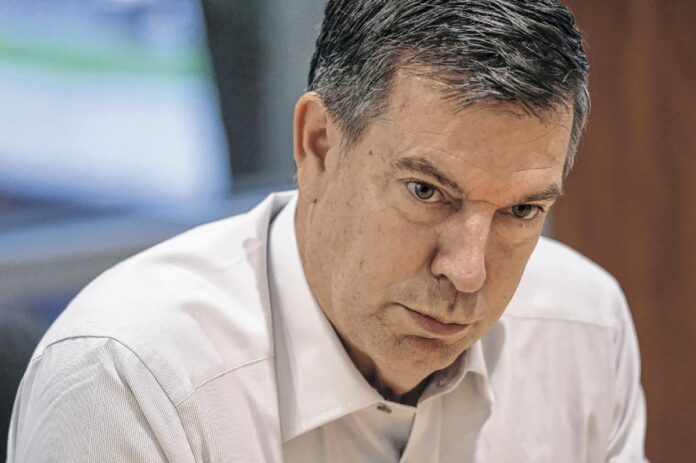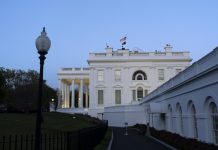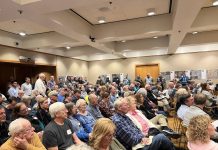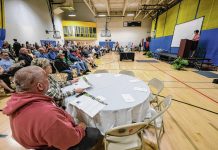
Cummins Inc.’s second-ranking leader is stepping down in a little more than a month, and it will mark the end of a long career in which he’s seen the company grow significantly and overcome serious problems to reach new heights.
The Columbus-based maker of diesel engines and power systems announced Aug. 21 that President and Chief Operating Officer Rich Freeland would retire effective Oct. 15, ending a 40-year career with the 100-year-old company.
“It’s been a great run. It’s a special place,” said Freeland, who resides in Columbus.
He grew up on a farm near Fowler, the seventh of eight children, and said that with the encouragement and support of family and neighbors realized educational opportunities that he didn’t think were possible.
[sc:text-divider text-divider-title=”Story continues below gallery” ]Click here to purchase photos from this gallery
That led to a job with Cummins immediately after graduation, and a career in which he’s climbed the ladder, led core business segments and led the company’s daily operations.
Freeland has seen the company survive serious struggles in the late 1990s and early 2000s, but recover to post records sales and profits. In his tenure, the company has expanded globally, notably in China, India and Brazil, and now has a diverse global workforce.
And, he’s had seen Cummins broaden its portfolio of products to now include electric powertrains.
Freeland said he’s had the luxury to do meaningful things with people he cares about.
He took some time recently to sit down with The Republic and discuss his decision to retire and his future plans, which include maintaining a residence in Columbus and continued involvement in the community.
Q: What made you decide now was the right time to retire?
A: No single event. It’s something I have been thinking about, and we actually put together succession plans in the company and we try to plan ahead a couple years, quite frankly.
I thought this would be a good year in the sense that I hit 40 years (with Cummins) this year, the company hit 100 years, I turned 62 last month. It seemed like a good kind of ending to the thing.
No specific event. I’m healthy, I like my job, everything is going well. I do have five grandkids now, and the idea is top spend a little more time with them. Sounds like a really good thing.
Q: Was it an easy or difficult decision?
A: This is all I’ve done. I came to work here … I graduated May 13 and went to work on second shift May 14 here. I’ve got up every morning here for 40 years. This is all I know. I love the business, I love the company, I love all the people I work with. So from that, it’s a hard decision. Walking away from that is hard.
But I think you need to plan and you need to put together good succession plans and people who are going to take what you’ve done and make it better, and take the company to the next level. From that standpoint, I knew we’re turning it over to some really incredible leaders, starting with Tony (Satterthwaite, who will succeed Freeland). That part made it easy.
Q: Did anything make the decision easier?
A: I do think the company … we’ve gone through a 15-year period of executing our strategy and delivering things, and as you’ve seen the company is going to be changing in the next five, 10 years. We’re making decisions now on new technologies and new products and new investment. I think it’s good the ones who will be deciding it will be the ones who will live through those decisions and implement them all the way through.
It wasn’t the driving thing, but as I looked at it, I thought this might be a good time.
Q: You’ve spent your entire 40-year career with Cummins, and have seen the company adapt and change. What’s most different about the company then and now? What is the same?
A: What’s the same, it goes all the way back to Mr. (J. Irwin) Miller (the former company chairman) and the view of how you run a company, and how you have different stakeholders. It’s not just about the shareholders and delivering profit, but it’s about representing your customers and your community. That piece goes back through our history, which really has not changed at all.
What’s changed is now it’s global. When I was hired in we were a North American company for the most part. We’re truly a global company. It’s pretty cool the way we’ve got this history, and you look here even in Columbus where you’ve got these multi-generational families that have worked at the company. Some of these families have made the company. Now you’re combining these brilliant people from all over the world. That combination is new and pretty special.
The principle behind it hasn’t changed, but the combination of legacy and history with new and creative and diverse is a nice combination.
My guess is there is so much product and change in the industry, but at any time if you’d ask whoever was sitting here they’d say, “There’s never been more change going on.” It feels that way right now, but it’s probably always felt that way.
Q: In the last couple years Cummins, known historically for making diesel engine, has added alternate forms of power generation to its lineup, such as electrification and hydrogen fuel cells. How do you feel about the direction of the company as you are stepping away?
A: I feel really, really good. What we’ve tried to do as a company is look where the macro trends are going. This goes again all the way back to Mr. Miller. If you look the last 15 years, emissions is going to be more important, being global is going to be more important, power shortages. So we’ve built capability and said, “Where are the trends going, and how do we build capability the we capture those trends?”
That’s where you’ve seen the tremendous growth we’ve had: China, India. We were tiny there 15 years ago. We created a components business because the emissions standards were getting tougher.
What we’re doing right now is saying, “What are some of those macro trends going on in the world, and how might they affect our company? And, how do we invest so when those things happen we’ll be best positioned to capture it?”
It’s kind of what we’ve done forever: invest in new stuff and try to pick your spots so you invest where the future is going, not where it’s been. That’s where we are right now.
When you’re in the middle of those it feels uncertain, but I think we’re confident these new technologies will happen at some point, and we’re confident we’ll be the ones to be best positioned to take advantage when they do happen.
What we do is we say, “If we’re not best positioned, how do we become best positioned?” You see us in some cases making some acquisitions of some companies on some technologies we don’t have, which we’ve done in the past. We didn’t use to have a turbo business; we bought a turbo business. We didn’t use to have an aftertreatment business; we bought an aftertreatment business.
Q: What would you say are the biggest challenges Cummins will face in the next 10 years, and why?
A: I think one of the big challenges — and it’s always been true — is getting the best people. A company is just a bunch of people. Can your bunch of people do a little better than the other company’s bunch of people? This idea of continuing to bring in the best talent if some of the skills and requirements change, that’s always been our challenge and the limiting factor.
I don’t worry so much about the technologies changing. We tend to view those as an opportunity. … We’re an old industry. We actually want change, we want new standards and new technologies coming. We’re pretty well positioned from our financial standpoint, from our processes, that if the race is harder we stand a better chance of winning than if the race is easy.
These cycles we go through, where business is up and business is down, we view those a chances for us. We make our passes during the changes; we gain share, we keep investing when other people don’t keep investing. When it’s tough … these changes create opportunity. … We’ve got a culture that I don’t take any credit for, but we’ve developed over time that embraces those changes pretty well.
… I think every company has things they write on their wall or on their sheets they hand out. I think this company executes and believes them better than most. One of them is in the area of sustainability. We set tough environmental targets for the company. … That’s a big challenge we put on ourselves, and I think everyone is excited about it.
Q: What accomplishments are you most proud of in your Cummins career, and why?
A: You want to deliver results. I think I’ve been able to do that it in a way that is true to who I am. I’ve got a way of leading that says I love working on teams, work collaboratively with customers and employees. You get good results and you do it in teams and you do it the right way. As a leader, that’s possible. I think we’ve been able to have more successes than failures along the way, and do it in a way that’s respectful of people and customers and employees and communities.
I don’t have a single accomplishment, if you will, that I would point to. I think for the most part we’ve taken on big challenges and gotten through them. When you figure out where you’re going to go as a company, especially in leadership roles the past 15 years, you’ve got to get more of those right than you get wrong. If you’re investing in the wrong places you’re not going to win.
…I like the fact that we know we’re not perfect. I think you get better if your recognize your failures, and you recognize where you need to get better. And then you create this environment where you’re kind of always striving to get better. I feel good that I’ve been part of creating a culture that, for the most part, has done that.
Q: Are there certain company accomplishments that are going to stick with you?
A: We came close to losing the North America truck business, which was kind of the heart of the company. We had product problems and lost market share. As a company 15, 20 years ago, we got back on track and reinvested and got that business right and began to grow share. That one feels really good.
We got out ahead and embraced emissions standards at a time when the rest of the industry is wondering and (asking) “Can you push those standards off?” We collectively — it was folks like (former Chairman and CEO) Tim Solso and (former President and Chief Operating Officer) Joe Loughery — said, “We’re going to embrace those and win the emissions race. It’s the right thing to do, it’s where the world is going, we’ve got to be great at it.” Being part of the team to help deliver that was pretty special.
The investments in our global business that we’ve made over the last 20 years are pretty impressive and the envy of everyone in the industry. What we do in China, India, Russia, Brazil, Africa. We quote 190 countries we’re in. We sell product there, we make product in many of those countries and we recruit people from all those. No one can match that.
Being part of those things changed the company the last 20 years.
Q: What are your future plans? Involvement with any other companies, groups or boards?
A: I’m on the Valvoline board, I do some work at Purdue, where I went to school. I’m on an advisory council there and will get more involved with that. I will get more involved in community issues.
…As I move into the third phase (of my life), hopefully I’ll keep learning, hopefully I’ll keep contributing, but I’ll swing more towards giving back at this stage.
I’ll get involved in causes. It will probably be around education — how we can create opportunities for people to get more education. I was given some of those opportunities and people helped me out or I wouldn’t have gotten an education. That’s important for me to do more of that. I work with some of the DACA (Deferred Action for Childhood Arrivals) kids here in town.
Q: You have lived in Columbus and have volunteered your time with some local organizations, such as Heritage Fund and Otter Creek Golf Course. How will Columbus factor into your future plans?
A: We’ll maintain a home here and we’ll spend a portion of the year here. I’ll continue to be engaged in community efforts here. Kind of on-demand. I work with some kids to try to get education, a lot of the immigrant population, to try to give them an opportunity to go beyond high school. I work with some people and I play a little, tiny role in that and I want to play a bigger role in that.
My wife (Tammy) is in many, many things. She’s a very valuable asset in the community, more so than me, so she’ll continue to be involved in many things as well.
[sc:pullout-title pullout-title=”The Freeland file” ][sc:pullout-text-begin]
Rich Freeland
Title: Cummins Inc. president and chief operating officer
Age: 62
Resides: Columbus
Education:
- Earned a bachelor of science degree in industrial management from Purdue University’s Krannert School of Management
- Earned a master of business administration degree from Indiana University’s Kelley School of Business
Professional background:
- Joined Cummins in 1979 at the Cummins Parts Distribution Center
- Plant manager of the Diesel ReCon Plant in Memphis, Tennessee
- Plant manager of the Columbus Engine Plant
- President of the Distribution Business
- President of the Components Business
- President of the Engine Business
- President and chief operating officer since 2014
- Board of directors Cummins Inc. since July
- Board of directors of Valvoline Inc.
- Advisory board member for Purdue University’s Krannert School of Management
Community involvement:
- Past board member of Otter Creek Golf Course
- Past board member of the Heritage Fund — The Community Foundation of Bartholomew County
Family: Wife, Tammy; daughters, Lauren and Jill
[sc:pullout-text-end][sc:pullout-title pullout-title=”Message to employees” ][sc:pullout-text-begin]
Below is the text of an internal note that Rich Freeland sent Thursday to Cummins Inc. employees worldwide, the day after the company announced his plan to retire Oct. 15.
On Wednesday, Tom Linebarger announced that I will be retiring at the end of October this year. While I knew the announcement was coming and have been planning for this day for some time, I still had a lump in my throat when I read the words. This led me to think about the range of emotions that I am feeling.
I feel a sense of pride in who we are and what we have accomplished as a company. This is especially satisfying as we celebrate our 100th anniversary, and I am profoundly grateful for having had a role to play. I am convinced that we all work for the world’s very best company. I certainly also feel some sadness as I leave. This emotion comes from knowing that I will miss all the wonderful people with whom I have worked over the years.
I feel fortunate to have begun my career at Cummins right after graduating from Purdue University. I joined as a second shift foreman in the Parts Distribution Center in Columbus, Indiana (USA). As a young foreman, I worked with employees who had more than twenty years of work experience. Even though I was their supervisor, I learned from them in so many ways. That culture of mutual respect is what attracted me to Cummins, and it’s what kept me here for forty years.
I feel grateful for how our company’s emphasis on diversity inclusion shaped my personal and professional life. Growing up in a northern Indiana farming town, I had little exposure to “diversity” in terms of race and religion. I did, however, see firsthand the power of gender diversity, raised by a strong mother and with five older sisters. Perhaps that early experience made me curious and fueled my desire to seek out the other elements of diversity. I also had the gift of observing how my parents lived their lives. They believed in hard work, being humble and being kind to others.
I did my best to live up to this example and was helped along the way by so many at Cummins. I was advised early in my career by longtime Cummins CEO J. Irwin Miller about the importance of getting to know and value the role of every employee no matter their position, age, education, ethnicity, background or personality. And so, I became a student, and all the people I came into contact with all over the world became my teachers.
Let me close where I began, by simply saying “thank you.” It has been an honor to work for this company for 40 years. Thank you for the friendships and sharing your unique talents and points of view with me. Thank you for making Cummins and each other better by treating people with dignity and respect. Thank you for making me a better leader and a better person.
[sc:pullout-text-end]




